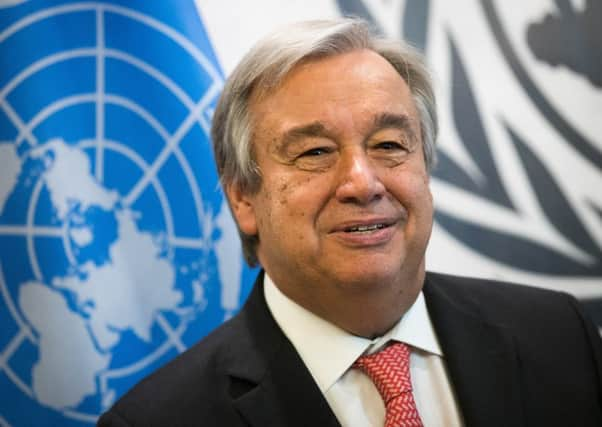David Johnstone: UN chief must marginalise the far right


The job is almost impossible. Hamstrung by the vested interests of different security council members, consensus becomes a rare and precious commodity.
There is, however, another immediate threat that Guterres must face when he comes to office on 1 January next year: the rise of right-wing nationalism, which is dangerously polluting the discourse of many countries throughout the world.
Advertisement
Hide AdAdvertisement
Hide AdHere at home, we seem suddenly to be on course for a hard Brexit, adopting a strict line on immigration. Only after an intense uproar was Amber Rudd’s proposal, to “name and shame” companies that hire too many foreign workers, shelved. Whether or not Theresa May personally believes in this hard-line stance her government is taking is unknown. However, it is difficult to shake the feeling that many leaders around the world, adopting the guise of nationalism, are testing the bounds of what is acceptable rhetoric towards immigration.
Abroad, Trump speaks of bans on Muslims, the right-wing AfD are on the rise in Germany, and French politicians are increasingly adopting an anti-immigration stance as a response to the looming threat of Le Pen’s National Front. Those who voice concern against such policies, are decried by their opponents as being somehow unfaithful to the true cultural identity of their country, and the nationalist voice slowly begins its creep into the everyday public sphere.
The main defence to this rise of right-wing nationalism must come from within these countries, from politicians, the media, leading thinkers, and most importantly the citizens themselves. However, Guterres, at the head of the United Nations must play an important role in this battle.
The UN has a responsibility to help forge a sense of global citizenship. People in all countries must feel an affinity to their fellow human; a respect, that values diversity as much as shared identities. In doing so, we can chip away at the fear that too often dominates our view of different cultures, and with it, will go the cornerstone of right-wing nationalist rhetoric.
Progress needs to continue on advancing the Universal Declaration on Human Rights, so that every global citizen shares, and is protected by, these fundamental rights.
Common goals will also help forge unity. The vision, outlined by the UN and Bill and Melinda Gates Foundation, of eradicating malaria by 2040, would provide the world’s governments and international development agencies with a shared ambition. If successful, the achievement would be akin to the eradication of smallpox, and would be celebrated as a global effort which finally rid the world of such a scourge.
Enforcing, and building on, the Paris Climate Agreement, while being an enormous test for the world, could also be its making. This is a problem that demands coordinated action between developed and underdeveloped countries alike. Anything short of a unified effort will see climate change wreak havoc indiscriminately across the globe. Tackling this problem as one is the perfect place to forge a sense of global citizenship, as, to varying degrees, we are all in this together.
Theresa May tells us that “if you believe you are a citizen of the world, you are a citizen of nowhere”. This is a regressive attitude, cloaked as nationalism, that preys directly on people’s fear of outsiders. The world is becoming ever more interconnected. It should be encouraged as a force for good, not resisted. Bringing our divided world together is an enormous challenge, but Guterres, at the helm of the UN, is well placed to lead such an ambitious project.
David Johnstone is a recent graduate in Economics from the University of Edinburgh with a background in third sector advocacy